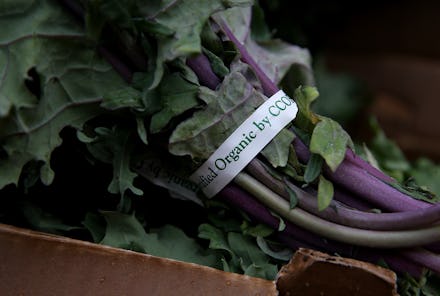Americans Don't Actually Know What "Organic Food" Means — But They Buy It Anyway

The news: If you're buying organic food, odds are you don't actually know what "organic" means.
A new survey from BFG, a brand consultancy, polled 300 shoppers and found that while almost 70% of them purchased organic foods, only 20% of shoppers correctly defined what "organic" really meant.
For the sake of simplicity, the United States Department of Agriculture defines a food as "organic" when it hasn't been genetically engineered or exposed to certain pesticides in regards to plants. As far as animals go, "organic" means the livestock wasn't treated with antibiotics or growth hormones, was fed organic feed, and had access to the outdoors.
But don't ask a shopper about that — they'd have no idea. Instead, BFG theorizes, shoppers seek out that magical "organic" label for other reasons.
"What I think we're seeing in grocery stores is that consumers are ultimately idealists," BFG CEO Kevin Meany told Fast Company. "They desire honesty. They want to believe. They trust the label, and they're willing to pay more based on that for something like 'all-natural' even though they're not totally sure what it means."
Supply and demand. So it seems instead of appealing to most customers' actual desire for certain foods, marketers are mostly just preying on good-natured shoppers who want to eat healthier and support more sustainable practices. And considering the organic food market is forecasted to grow 14% each year for the next four years, that'll keep marketers busy for quite a while trying to convince shoppers their "organic" food is more "organic" than their competitor's.
This whole arrangement becomes even stranger when you realize that some of the most popular organic food brands like Wholesome & Hearty, Kashi and Health Valley are actually owned by food giants like Kellogg, PepsiCo and Hain Celestial, a former partner of Heinz.
The Atlantic points out that consumers likely don't believe cheap organic food is healthy. Instead, they prefer to opt for the pricier organic foods, assuming the higher cost equates to higher nutritional value. And while some chefs may argue that organic products will have better flavor if grown properly, for the average shopper, the difference is often minimal considering organic food probably isn't any healthier or more nutritious.
So while worried moms and farm-to-table-obsessed hipsters will claim organic food is the only real way to enjoy the bounties of Mother Gaia, the truth is they probably don't even know what organic means. Talk about food for thought.